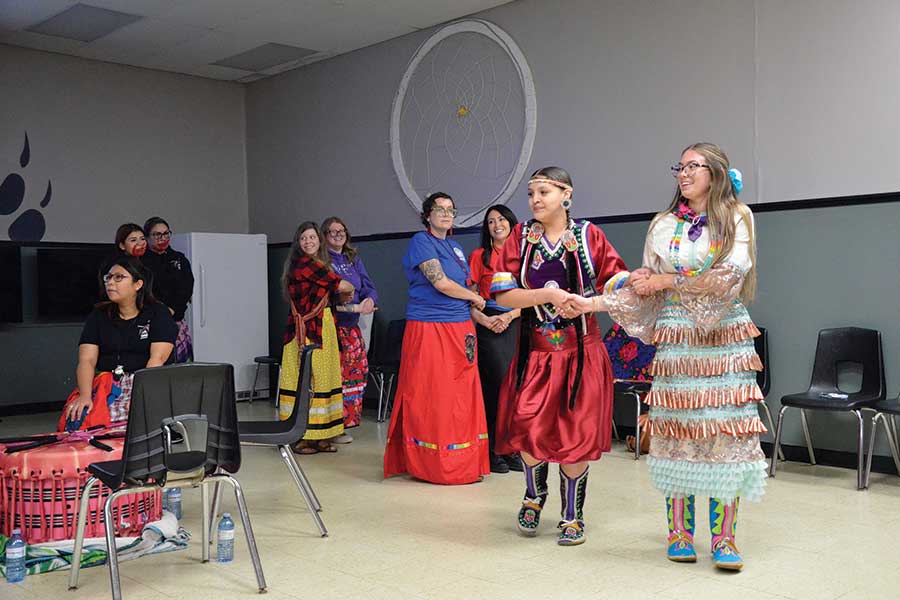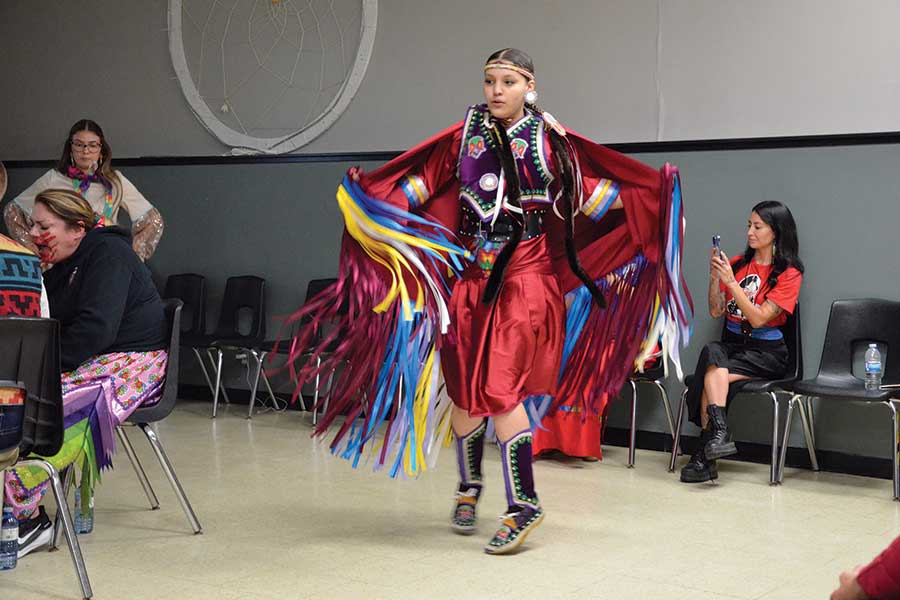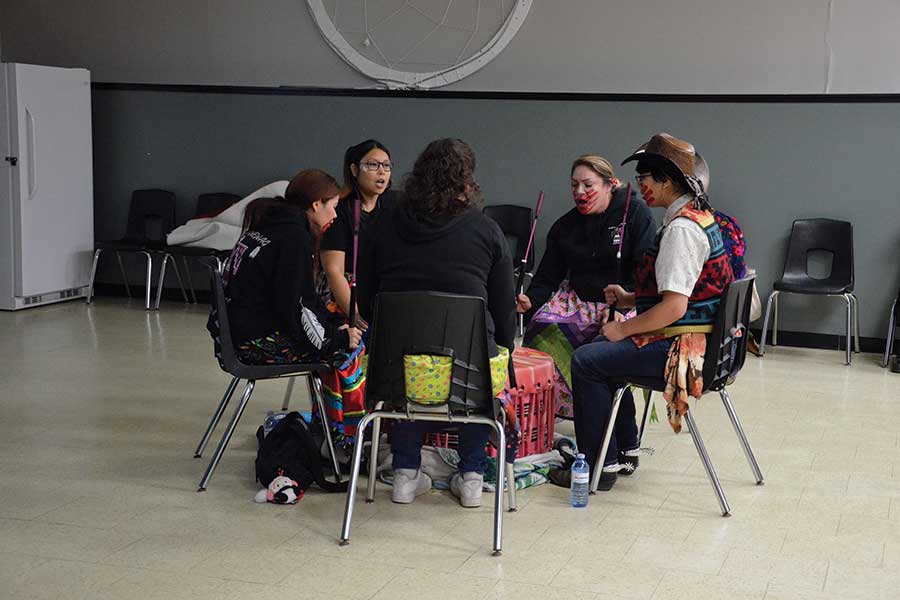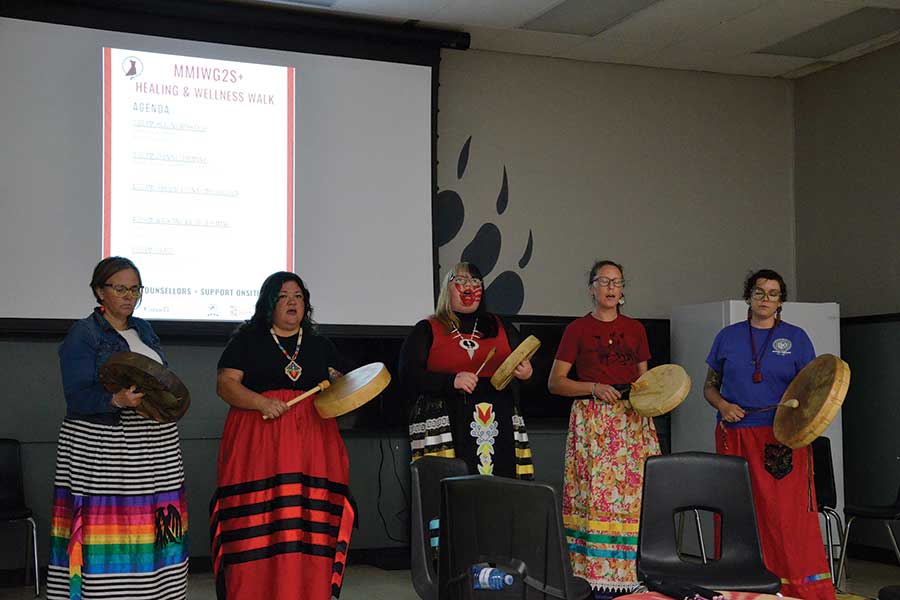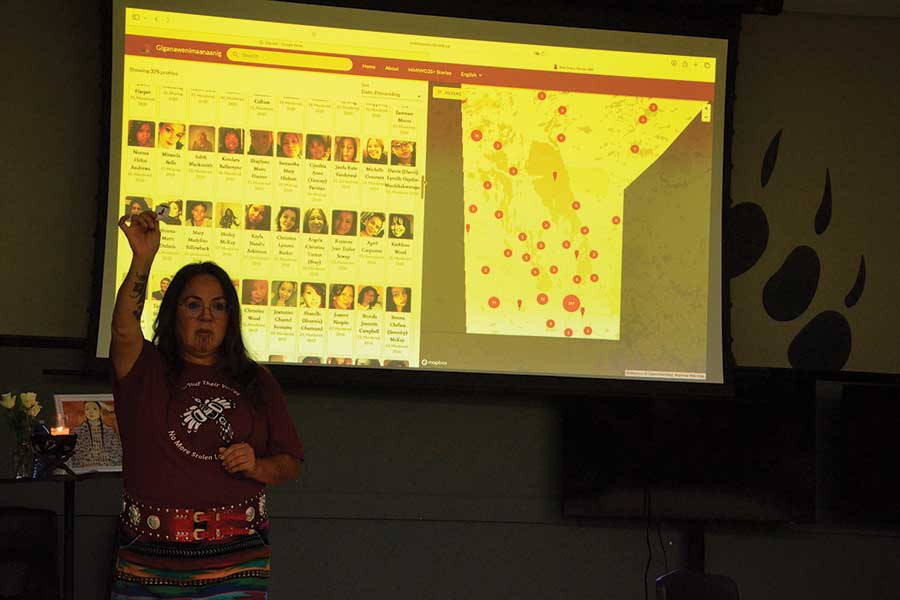Remembrance and healing on the National Day of Action for MMIWG2S+
It was the National Day of Action for Missing and Murdered Indigenous Women, Girls, and Two-Spirit People on Oct. 4, and the Selkirk Friendship Centre hosted a day of remembrance and healing.
The day started with a healing workshop involving a sound bath and breathwork put on by Casandra Carmelina Orantes of Breathwork by Cas.
From there, Jeannie White Bird, a Knowledge Keeper in our community, began the opening ceremony.
“That’s my biggest thing that I can share about myself, being that grandmother, because myself I didn’t get to know my grandmother, but I am also blessed to be surrounded by many grandmothers in the community. I am also blessed to be surrounded by many grandchildren in the community. This is one of the things that, as a survivor of violence, and also having a mother who is one of the missing and murdered, those relationships have been fractured. But it’s through ceremonies like this, it’s through teachings like (Casandra) has shared with us, it’s through the drum which our friends will also sing, it’s through the the hand drums, it’s through the big drum, and it’s the medicines, and it’s the community, it’s the leaderships, that highlights these stories up on the national public radar, and that’s where they need to be, that’s what this is about,” said White Bird.
She explained that this gift of remembering and coming together in healing is a gift that we give to each other at these events, and then introduced the Selkirk Women’s Drum Group, who lent their voices to this event.
Keeping with the theme of the day, the drum group started with the Women’s Warrior Song and Strong Women’s Song. The next song that they shared was the Children’s Healing Song, which has a double beat representing the heartbeat. This song is not just for the children lost but for the inner child which may need healing. The final song that they shared was the Bear Song. To local Indigenous people, the bear represents courage, and so, this song represented the courage it takes to come to events like the National Day of Action for MMIWG2S+, which involves a lot of remembrance, acknowledgement, and action to help support healing in our community.
White Bird then welcomed our local dignitaries to the stage so that they could share their thoughts on the importance of remembrance for MMIWG2S+ people.
Local MP James Bezan spoke first.
“We are all connected, knowing that there are daughters and sisters and mothers and grandmothers that were murdered or missing, and we still want to demand justice for all those that were lost. And so, we have to continue to focus in on making the proper changes to keep those that are committing gender-based violence held to account and paying the price for their crimes, so that we don’t see ongoing repeats of this intergenerational trauma carried forward,” said Bezan.
He explained that this violence is three times as likely for Indigenous Canadians based on population when compared to the rest of Canada.
“We have the national report that came out in 2019 (and) there is an action plan. It’s inherent upon us as leadership in parliament, in national legislature, in the City of Selkirk, that we can all continue to make sure that the appropriate steps are taken so that we can protect all women and all girls and all people that are Indigenous and non-Indigenous that are exposed to this type of violence. We have to bring it to an end, and that’s what today is all about, raising that awareness, making sure that we have that opportunity to action those items to make all of us safer in our communities,” said Bezan.
Local MLA Richard Perchotte then came to the front, starting by thanking the Friendship Centre for creating an atmosphere where people can be vulnerable and receive support before discussing his personal story of losing a family member to domestic violence.
“We need to stand together and to make sure that we stand for everybody and say, ‘Never ever can we allow this to happen to anybody in our lives.’ Stand up for your neighbour. Stand up for your grandmother. Stand up for your mother. Stand up for your daughter, your sister, your child, whoever it may be,” said Perchotte.
White Bird thanked Perchotte for sharing this powerful message, saying, “Standing up is one of the most simple and significant actions that all of us can take.”
She then introduced Selkirk Mayor Larry Johannson, who spoke about how trauma is passed down intergenerationally.
“I grew up as a child in the 50s and the 60s, in a neighborhood that we didn’t know race. We were all together. We played together, and it didn’t matter who you were, what colour you were, but the thing that we all had in common was (that) we were in a working-class neighborhood with working-class families. And we all had fathers that fought in World War Two, and they all came back a little different,” he said.
Johannson went on to explain that many of those men who served in their teens and twenties came back with dependence on alcohol and drugs as a coping mechanism for the trauma that they endured.
“They would come home on a Friday night or Saturday night. We as kids knew to stay clear, stay out of the house. And unfortunately, the mothers knew the same thing, and they would all leave the house and they wouldn’t go back until they were sure that the husband was sleeping it off. Well, that was in the 50s, and that was in the 60s. So, let’s move ahead to 2025, and what are we doing? We’re searching landfills for our girls. We’re searching landfills for our women. This is a day of action, and from this day forward, let’s press the leadership. Let’s press each other to do better, because what I see from the 1950s and the 1960s to 2025 is we’re still struggling,” said Johannson.
After our political representatives, Carly Chartier of the Selkirk Friendship Centre, thanked everyone for being there. She then went on to discuss how violence affects our community and how they try to help.
“This year alone, we’ve seen a huge increase in women that are coming to our building seeking safety and shelter, and are in that moment, running from an unsafe situation. And in that moment, we bring them in, we make sure that they’re safe. We often clothe them, give them something warm to drink, something to eat, settle them down, and then our counsellors get to work with them immediately. And from there, we start branching out to our partnerships,” Chartier said.
Representatives from Survivor’s Hope Crisis Centre, Chantal Shibata and Natasha Van Dorp, then came to the podium to discuss the local services that their organization provides that can help.
“Survivors Hope Crisis Centre is a crisis and resource centre where we support those who have been impacted by sexualized violence. (We could help) anybody in the Interlake of all genders, 13 years old and up,” said Shibata.
Van Dorp explained that their service is 24/7 and they work in many different ways to help people impacted by sexualized violence from the moment it takes place and the person seeks help to the next steps and support afterwards.
“We really lead from a non-judgmental approach, and we very much enjoy what we do, which is really odd to say, but it is a service that is very much needed. We have seen an increase in calls as well,” she said.
They welcomed anyone who needs their support to get into contact with them. You can learn more about Survivor’s Hope at https://survivors-hope.ca/.
“We’ll meet people where they’re at in community. Give us a call anytime, and we will be there for you. We will sit with you, and we believe you,” said Shibata.
The next part of the program was a video speaking about the Manidoonsag Imaa Mikinaako-Minisiing/Sacred Spirits of Turtle Island space at the Gaynor Family Regional Library and how a healing space like this was created in Selkirk.
Jeannie White Bird, who was a big part of this project, also said a few words about it before turning attendees’ attention to a new project in Manitoba that was launched on Oct. 4, Giganawenimaanaanig/Red Dress Stories MB (https://www.reddressstoriesmb.ca/).
“If we look on the website, which I encourage everybody to do. It’s going to show the map of all the missing and murdered. It’s a database,” she explained.
This website allows those who were lost to be remembered and their stories shared. More information can be found on the website itself.
The indoor ceremony concluded with the drum group, the Binesi Ikwéwag Singers playing the big drum while jingle dress dancer Tehya Blackburde Moore and fancy shawl dancer Aubrey Ducharme-McKay danced and then led the group in a round dance.
The event then moved outside, where participants, wearing their red shirts, walked to the waterfront for a water ceremony. Once they returned to the Friendship Centre, there was a feast to end the day.
This event was funded by Orange Shirt Day and the National Truth and Reconciliation Commission Fund.
